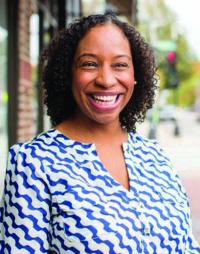May 16, 2019

As Boston Police districts in Dorchester and South Boston begin training with new body cameras, efforts to address spikes in violence and the resulting long-term trauma are ongoing at the city and local level.
City Council President Andrea Campbell is calling for a hearing on how violence prevention and intervention funds are being used in the city. Campbell, whose District 4 covers Dorchester and Mattapan and pieces of Jamaica Plain and Roslindale, filed a hearing order at last week’s general council meeting.
“Obviously with the uptick in incidents of violence in my district, in the city as a whole, and in certain communities, one way to respond is to ensure that we have adequate city resources going towards violence prevention and intervention,” Campbell told the Reporter.
Campbell notes the millions of dollars in state grants, through mechanisms like the Shannon Grant and the Safe and Successful Youth Initiative (SSYI), dedicated to violence prevention and intervention programs. But she feels there is no clear way to track or assess the effectiveness of those funds.
The city needs clear objectives for the money, Campbell said. That aside, a more open process for deciding how funds are awarded and what metrics programs should use to determine a successful outcome.
“I’m not sure that there is a common understanding or practice within the city of Boston,” Campbell said. “The BPD grant division does some incredible work, but they’re often frankly under-resourced and overworked. So, the question is of all the departments that have their hands on violence prevention and intervention monies, are we all on the same page with respect to transparency and accountability?”
She was joined in her hearing order by the rest of the council. Campbell’s team is making a list of stakeholders and officials they will ask to testify at the hearing, which does not yet have a set date.
Another measure the Mattapan resident and councillor has pushed – the body camera rollout – is seeing some movement. Some officers in South Boston and Dorchester have started the training process for using body cameras on the job, which is expected to enter normal use later in the spring.
Officers in the C-6 and C-11 districts and gang unit received phones that work with the body cameras in April, police said. Training for those officers began the week of May 6 and is expected to take a few weeks.
“Boston is a model city in our nation for having strong police-community relations, and our goal is to continue building trust and positive relationships between law enforcement officers and community members,” Mayor Martin Walsh said in a statement. “We will continue to move forward in implementing a body camera program here in Boston as a way to support the incredible progress we have made in community policing.”
The city did not provide details on how the police districts were chosen. A year-long body camera pilot program concluded in late 2017, after 100 randomized officers in districts B-2 in Roxbury, B-3 in Mattapan and Dorchester, D-4 in the South End, 14 in Brighton, 18 in Hyde Park, and members of the Youth Violence Strike Force were matched up to compare the types of interactions of camera-wearing officers against a control group without them.
A full report released in late 2018 showed small reductions in citizen complaints and use of force complaints. Walsh said at the time that the city would move into a “phased in” approach. The first phase appears to have begun in South Boston and Dorchester.
“I haven’t been looped in of late,” Campbell said. “So, we filed a hearing order last year and then re-filed it, asking some specific questions about now that we have agreed to do a full implementation, how are we going to roll that out? What would those phases look like? Which districts will be equipped with body cameras in the first phase, the second, and the third? What metrics and criteria are we using for that roll-out to decide which districts get the cameras? How will the $2 million we invested in the FY19 budgets be used? We have yet to have the hearing and we’re waiting on the administration.”
Shekia Scott — co-founder of the Boston Police Camera Action Team — told WBUR that gradual implementation feels unnecessary because the program has already been tested. She is watching the roll-out and policy around the camera implementation, she said.
“The camera helps us take a look inside of our policing system: Does it work? What do those daily interactions look like? And what can we do to improve that?” she told WBUR.
Arising from listening sessions with survivors groups and anti-violence advocates like Tina Chery with the Louis D. Brown Peace Institute, Campbell said a first Constructing Peaceful Communities workshop is planned for this Friday (May 17). It will focus on addressing incidents of violence from “prevention, intervention, enforcement, and re-entry” standpoints through dedicated teams.
The workshop will run from 6 p.m. to 8 p.m. at the Mattapan Teen Center on Hazelton Street.
“It’s a space that we will frequently create for our residents to come together to talk about how they’re feeling with respect to these incidents of violence,” Campbell said, “but then to roll up our sleeves as a community and say, ‘Okay, now what are we going to do about it?’”


